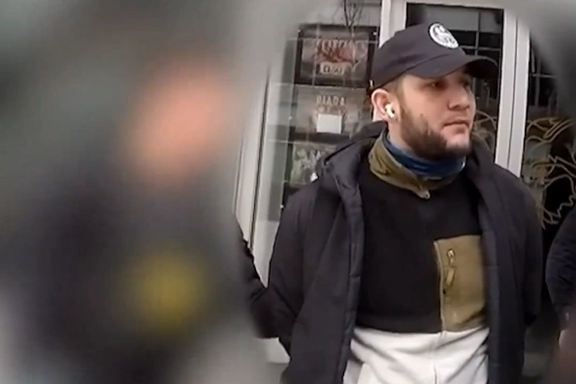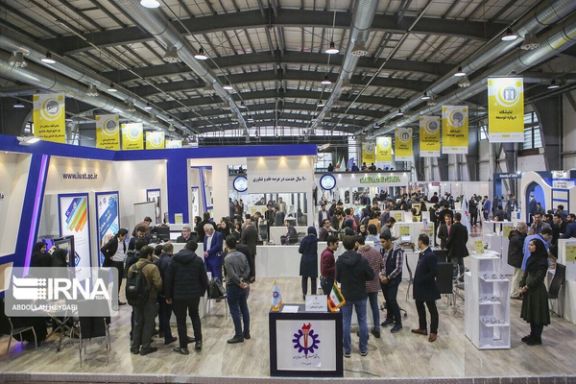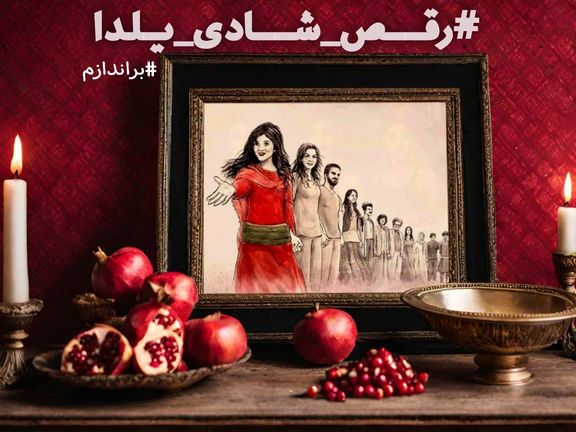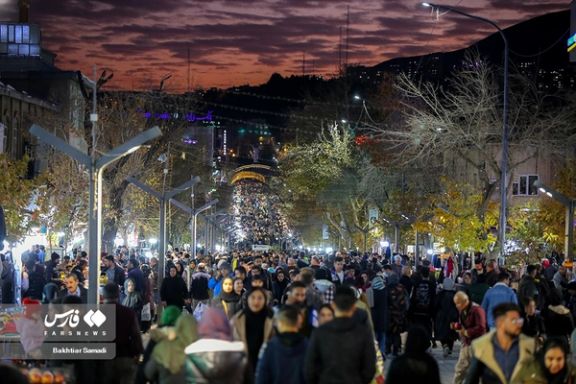Two Workers Hang Themselves At Iranian Petchem Plant

Amid dire economic conditions, especially for wage-earners, two Iranian workers hanged themselves at the site of the petrochemical plant that had fired them.

Amid dire economic conditions, especially for wage-earners, two Iranian workers hanged themselves at the site of the petrochemical plant that had fired them.
Javad Norouzi and Mostafa Abbasi, two workers from the Ilam petrochemical complex in the province’s Chavar (Chovar) district, attempted suicide in protest against their job terminations. They survived thanks to prompt intervention by their coworkers and were taken to the hospital, but their condition is critical.
Workers in petroleum and petrochemical companies in Iran are particularly vulnerable due to their challenging working conditions and low wages. However, suicide by workers in other industries, as well as teachers, has become a prevalent phenomenon in Iran.
Reports indicate that employees at Chavar have to endure harsh working conditions and receive very low wages. This, combined with the worsening economic situation in Iran, has contributed to unbearable livelihood problems, leading over a dozen other workers to end their lives in the past few years.
A notable issue is the absence of an independent trade union organization for the over 1,000 workers at Chavar Petrochemical Company, most of whom are contracted employees. This lack of job security, insurance, and benefits exacerbates their challenges.
The workers of the company have held several rounds of protests, but their appeals to the labor ministry and governorship have not yielded positive outcomes.
Food prices have risen by more than 80 to 100 percent in recent months, on top of high inflation in the past few years, while most wage earners get less than $200 a month.

While Iranians suffer from the highest inflation rate in decades, with a record devaluation of rial, a lawmaker claims oil exports reached over 1.5 million barrels per day.
Behrouz Mohebbi Najmabadi, a member of parliament’s budget committee, said that when the current administration took office, the country's daily oil sales were 400,000 barrels. “However, by utilizing the capacities of neighboring and special allied countries, such as the Shanghai Cooperation Organization, BRICS, and regional agreements, today Iran's crude oil sales have exceeded 1.5 million barrels per day."
According to Najmabadi, the previous administration sought to raise the country’s crude exports through lifting the sanctions, but President Ebrahim Raisi's government devised a sanctions-neutralization plan in addition to diplomatic pursuit of removing the sanctions.
He claimed that global developments, particularly Europe’s sanctions on Russia over its invasion of Ukraine, was one of the factors contributing to the rise in Iran’s oil sales.
“Today, Iran is experiencing better economic conditions, and economic growth is a result of these developments,” a claim in stark contrast to the realities of life for Iranians who do not see any progress in solving their economic woes.
Earlier in the week, the CEO of the National Iranian Oil Company announced a 60% growth in the country's oil production over the past two years despite global sanctions. Iran’s oil minister Javad Owji claimed last month that the country is producing 3.4 million barrels per day (mb/d) of crude oil.
Despite full US sanctions on Iranian oil exports imposed in May 2019, China remains the primary buyer. Initially, Iran's shipments dropped significantly to around 300,000 barrels per day. However, following the Biden administration's indirect talks with Tehran to revive the JCPOA nuclear deal, Chinese purchases increased. Some observers suggest that the United States has exercised restraint in cracking down, possibly to avoid jeopardizing the prospects of a nuclear deal.

The Central Criminal Court of England sentenced a man arrested for gathering information on Iran International's London headquarters to 3.5 years behind bars.
Originally from Chechnya but residing in Austria, Magomed-Husejn Dovtaev (Mohammad-Hussein Dovtaev) was detained at Chiswick Business Park by officers from London’s Metropolitan Police Counter-Terrorism Command in February. He was charged with a single count of attempting to collect information "likely to be useful to a person committing or preparing an act of terrorism." The jury court returned a guilty verdict for him on Thursday.
Dovtaev is required to serve two-thirds of his sentence of three years and six months. The 10 months he has already spent in custody since his arrest will also be counted as part of his jail term.
“This trial was a reminder of the threats journalists and news organizations face. Journalism is under attack across the world from those who seek to suppress media freedom,” Iran International said in a statement after the verdict was announced. “We will not be cowed by threats. Our journalists will continue to provide the independent, uncensored news the people of Iran deserve,” stated the news and television network, which is the the most viewed foreign-based channel in Iran in the absence of free media in the country.
During the course of the trial, the police also released footage of Dovtaev gathering information about the security arrangements around the office building that housed Iran International and recording videos of the area. The police also released footage of the moment he was arrested.
Prosecutors said Dovtaev covertly filmed material on his phone in order to "identify vulnerabilities" in the media company's security which could be exploited by others.
Dovtaev’s botched operation was only a tip of the iceberg of Islamic Republic’s attempts to silence Iran International. Earlier in the week, UK’s ITV revealed that the IRGC was plotting to assassinate two Iran International television anchors in London in 2022 amid Iranian anti-government protests. Iranian spies offered a people-smuggler $200,000 to target the Iran International site with a car bomb.
Due to the the difficulty of passing the building's security, the initial plan was a car bomb but later was changed to assassination of two anchors while there were discussions of killing several directors of the channel. The plot was foiled because the man hired to do the job turned out to be a ‘double-agent’ working for a western intelligence agency. He would relay all the information to his handler and has now shared some details with ITV. Based on irrefutable evidence – seen and verified by ITV and multiple officials – the plot was commissioned and signed off by Mohammad Reza Ansari, the IRGC commander in charge of assassinations outside Iran. Ansari is the ‘mastermind’ behind failed plots to assassinate former US officials Mike Pompeo and John Bolton – for which he was sanctioned by the US treasury.
In a statement, Reporters Without Borders (RSF) condemned the Islamic Republic's "shocking tactics used by Iran to silence critical voices," calling on the UK government to do everything it can to hold Iran to account and ensure the safety of Iranian journalists.
"Iran will stop at nothing to intimidate journalists, abroad just as at home. It is good news that these particular plots were foiled, but they won’t be the last. The UK government must step up efforts to stop Iran’s brazen attacks and ensure adequate safeguards are in place to protect journalists,” said Fiona O'Brien, the RSF UK Bureau Director.
Prosecutor Nicholas de la Poer told London's Old Bailey that Iran International became a target for reprisals following its reporting on the death in custody of Mahsa Amini in Iran last year and subsequent protests in the country. Iran's minister of intelligence later declared Iran International a terrorist organization, de la Poer said, which meant its employees "became targets for violent reprisals".
In November 2022, Volant Media, the parent company of Iran International, said that two of its journalists had been notified of direct threats. Following the significant escalation in Iranian state-backed threats and advice from the London Metropolitan Police, Iran International TV announced in February that it reluctantly and temporarily closed its London studios and moved broadcasting to Washington DC. After months of hiatus in broadcasting from the UK, the network relaunched operations from a new London building in September.
According to Iran’s Intelligence Minister Esmail Khatib, the Islamic Republic regards Iran International as “a terrorist organization.” He has stated that its staff and anyone affiliated with the channel will be pursued by the Ministry of Intelligence all over the globe, reiterating threats to “punish all those” who had a role in popular protests against the regime, wherever they might be.
Since its inception, the Islamic Republic of Iran, has been engaged in plots against Iranian opposition in exile. Some attempts have been more successful than the others, but the regime has never ceased threatening and targeting those who dare speak against it, even those ostensibly safe in western Europe or the United States.

Iran will hold an international exhibit of communication and information technologies next week with only Chinese companies participating, officials said.
Hamed Biazar, an official in charge of the exhibition said that organizers tried their utmost to secure the presence of other countries about the event, but their attempts failed.
Iran is under US and some European sanctions that deter international firms from dealing with the Islamic Republic. Any dealing with Iran could constitute a potential violation of sanctions. Repeated hostage taking of foreign nationals by the Iranian authorities is another factor in drastically reducing travel to the country.
Biazar said that even Russian firms refrained from participating in the exhibition, which left only six Chinese companies as the only foreign entities present.
Another official, however, argued that the absence of foreigners is related to the Christmas holidays but did not explain why Muslim countries are absent.
Iran is also accused of vast cyber disruption activities and sophisticated hacking operations around the world. Microsoft and other major tech companies have repeatedly reported illicit Iranian cyber activities.
The government also has one of the world’s most restrictive internet access policies, with thousands of websites and most major social media sites blocked.
Attendance has declined in similar trade exhibits in recent years. An electronics and computers show last year reportedly attracted 120,000 people while the same event a decade ago brought more than 400,000 people to the venue and many foreign countries and firms were present.

Authorities in Iran have resorted to marking the pre-Islamic Winter Solstice festival to placate the people angered by economic crisis and corruption scandals.
Iranian media reported in November that the Supreme Council of Cultural Revolution (SCCR) had renamed certain events on the official calendar including the pre-Islamic winter Festival of Yalda, which millions of Iranians celebrate on the night of December 21 when winter begins.
The council which is tasked with neutralizing non-Islamic cultural influences and ideologies, among other things, had decided that the day of the Winter Solstice be referred to as "Day of Promoting the Culture of Hosting and Connecting with Relatives” in the calendar.
Family of Mahsa (Jina) Amini, remembering their daughter on the longest night of the year.
Many believed that this irrelevant name was an onslaught on the deep-rooted culture and customs of Iranians.
Iran's religious establishment and hardliners often refer to ancient festivals as "pagan" calendar events and sometimes even demand that they should be banned. But despite endless religious propaganda, ancient traditions appear to have gained more popularity since the 1979 Islamic Revolution.

In defiance of the regime, social media users vowed to celebrate their beloved festivals such as Yalda, which they celebrate with family and friends, with even more splendor and merry-making this year, and shared numerous jokes about the lengthy new names assigned to their cherished festivals.
Municipality billboard in Tehran Honoring Yalda
The public's reaction to the renaming of the ancient festivals was so strong that the Council's spokesman, Abbas Mirza Hosseini, had to deny the removal of the names of ancient festivals from the official calendar. He claimed that the new names were only complementary and emphasized the "national identity and Islamic-Iranian culture and civilization."
In the past few days, presumably in response to such criticism, IRIB, which has a monopoly on broadcasting in the country, has shown unprecedented interest in the celebration of Yalda. It has also aired some Yalda entertainment programs including one with stand-up comedian Hassan Reyvandi who had been persona non grata at IRIB for some time.
The municipality of Tehran and some other cities also displayed an unprecedented interest in honoring Yalda. A massive billboard in Tehran’s Vali Asr Square congratulated citizens for Yalda and municipality trucks decorated with balloons and mascots played music on the streets.
The family of a victim of last year’s protests, Erfan Khazaei, celebrated Yalda at his grave.
The celebration of Yalda on the night of Winter Solstice and the Iranian New Year (Nowrouz) on the day of Spring Equinox both date to ancient, pre-Islamic times. The non-Islamic Nowrouz is still the main calendar event for most Iranians. The strength of the Nowrouz tradition is such that even the Supreme Leader Ali Khamenei makes a televised speech on that day.
Iranians send each other millions of text messages to congratulate Yalda just as they do on Nowruz, and increasingly more in recent years, Christmas and western New Year.
“I do not understand the resistance that some [in the religious and political establishment] show against elements that build culture and a sense of national identity,” former government spokesman, reformist politician and sociologist Ali Rabiei wrote in a commentary in Etemad newspaper Thursday entitled “The Indelible Yalda”.
Rabiei opined that introducing a new name for the festival in the calendar was an attempt to obscure the festival’s ancient roots through “historical transformation”. He also urged the regime to stop “engineering cultural calendar events”.
“The pressure of the people and public opinion has forced the Islamic regime to retreat repeatedly in the past 44 years in trying to ban music, short-sleeved clothes, video players, satellite TV, Yalda night, even Nowruz … Don't underestimate your power,” a tweet said.

Amid ongoing human rights abuses and military aggression across the region, the US Special Envoy for Iran delivered a message expressing solidarity with the people of Iran on Yalda night.
The stand-in envoy, Abram Paley, said: "On this Yalda night, we want the people of Iran to know that the United States will continue to support your aspirations for a free and democratic future. We are confident that Iran will overcome this period of darkness, and that brighter days are ahead."
Matthew Miller, State Department Spokesman, also joined in marking Yalda night, saying: "On the longest night of the year, we join the people of Iran and the wider region in looking forward to brighter days ahead. Happy Yalda to all who celebrate."
Yalda night, an ancient Iranian celebration, marks the longest night of the year, observed from the last night of Autumn to the sunrise of the first Winter day in the northern hemisphere.
Celebrated in multiple countries, including Iran, Armenia, Tajikistan, and Afghanistan, traditions include reading Hafez poetry and enjoying pomegranates, watermelons, and assorted nuts.
The symbolic celebration underscores the victory of light over darkness. In Iran, where most are now living under the poverty line in the worst economic crisis in recent history, and oppression continues to deepen, many in Iran are feeling the country is in its darkest times.